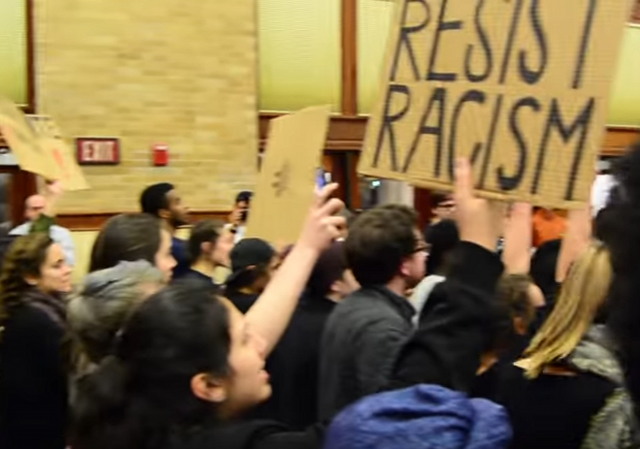Writer Offers Solution to Heckler’s Veto on College Campuses
Hold them to the same rules as the speaker.

A writer named Parker O’Brien has written a great piece at Medium which offers a solution to student mobs who shout down speakers.
Take a look:
Quick Take: Free Speech on College Campuses
Schools have long understood the volatility of controversial speakers and a disquieting response to this behavior has been the imposition of increased security costs on the organizations hosting the speaker. On a certain level it makes sense, if a group’s event requires increased security, then they should pay for it. However, it is not the group’s event that causes the need for increased security, but the protests launched against it. This allows a sort of heckler’s veto for protesters by driving up the cost of hosting certain speakers.
Allow me to propose a very simple solution. Just as schools allow freedom of speech for event speakers, it should also allow the same for protesters, with the same requirements. This means registering the protest with the school, paying required fees for security and cleanup, and designating a reserved space for the protest. If group events cannot choose an auditorium at random and without approval, then why should protesters be allowed this privilege? This policy would create accountability for any escalation by either side and remove the ability for protesting groups to impose financial hardships on their opponents. Until schools treat both sides equally there is little reason to think that we’ve seen the last of the violence as blame can be readily shifted to ‘outside agitators.’
Donations tax deductible
to the full extent allowed by law.








Comments
good idea. from their POV, of course, their moral certainty, which inspires their actions, demands confrontation and rejects any equivalences btw them and the “other”, btw imperialist oppression and resistance.
can the arbiters (univ admins) understand how valuable for them to adopt this principle? one would hope. but so far the track record of information professionals and authorities in the 21st cn suggests a dim prognosis.
If memory serves, a lot of cities use that approach to handle protests.
( The ones that do, don’t usually have riots. )
The violent types looking to loot, kill, burn, and pillage will be very easy to ID and “deal with”. No innocent “human shields” so to speak.
Here’s a better idea: When protesters shout over the speaker, arrest them for disorderly conduct and sentence them to a short jail term. Also, suspend them from school briefly.
When the protesters get violent, arrest them for assault (or whatever is appropriate), make sure they do real jail time, and expel them from school.
You see, the writer’s option only work if it’s enforced. But there are already things that can be enforced. We call them laws. Why not try using those?
What? And have the crime rate on campus increase as a result? That would hurt their standing in national rankings and strike a blow to their chances to recruit paying students.
“Here’s a better idea: When protesters shout over the speaker, arrest them for disorderly conduct and sentence them to a short jail term.”
Even better, arrest them, prosecute them, sentence them to jail, and impose a fine on everyone arrested that covers the security costs. This method would insure that the protesters pay for all expenses incurred and no groups are penalized for inviting the “wrong” people.
All suggestions are on the mark if it weren’t for the fact that Administrations and Board of Directors are at the heart of the escalation of a progressive agenda. Professional staff and administration are the MSM on campuses; Biased and Punitive to the opposition. They are a larger part of the problem on campuses as are the student, they being the adults. Like undisciplined or unaccountable children, they, Administration, have lost control and now are at odds to try to contain it. They do not subscribe to accountability (“Tough Love”), but do subscribe to the financial luxury of coddling and nanny oversight. Take Federal money out of this level of education and implement a 4 year graduation rate and watch the Board of Directors and Alumni begin to implement best practices policies that meet the needs for all students.